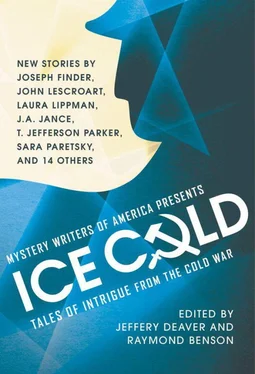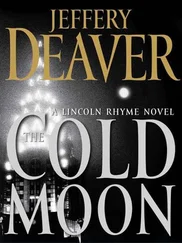“Go ahead,” says Captain Laughton. Puffing out his chest. As if to say, This all goes through me. I have authority here.
“Did you know Anna Hoppler?”
“Sure,” Miller says. “Everyone knew Anna.” A slippery little smile.
I feel a twinge of anger at this. At its rudeness, at its casual, insolent carelessness. Corporal Chad Miller, operating with impunity. The American military moved liked kings. Immune. Lofty. Unassailable. Heroes, unscarred and untested. “What does that mean, everyone knew Anna?” Does that mean everyone slept with her?
“A group of guys from the base used to party with her and her friends.”
“Regularly?”
He considers. Cocks his head. “Off and on.” That slippery little smile again.
Off and on. I leave it alone for now.
“Were you partying with her on November ninth?” The night the wall fell. The night Anna died.
“Everyone was partying with everyone, man.” He smiles. “It was some wild shit.”
And though he is pretending to be a regular American dumbass GI—and doing a passable job at it—I am picking up more. And here is what I already feared, and what Chad is already confirming. It was such a wild, confusing, crazy night over here, you’ll never be able to sort out who was where, who saw what, who was doing who. Generalized insanity—the perfect cover for murder. As the murderer would know in a premeditated way—or get extremely lucky with, if it was a crime of impulse or passion.
“Do you know where Miss Hoppler worked during the day?”
He shakes his head. “Nah.” Still playing the dumb soldier.
“You don’t know she worked at the hospital pharmacy?”
He shrugs.
I look at his wrist. “That is an awfully nice wristwatch, soldier,” I said.
The arrogance, the insolence, to wear that wristwatch to a meeting like this. Or perhaps, not to even think about it? It could not have been more apparent. Chad the black marketeer. Casual or big time, remained to be seen.
There is probably no more vibrant black market in the world than Berlin’s. No surprise. All the abundance of the West on one side of the wall, all the want and need of the East on the other. It creates an irresistible vacuum, a spinning vortex of goods and desire, with everything imaginable swirling in it—jeans, TVs, computers, cell phones, watches, cigarettes, liquor, jewelry. Even chocolates and candy. And, at the center of the swirling vortex, of course, its common currency, its constant rate of exchange—drugs.
“American goods. And with them, American values,” Grimmenkauf mutters summarily, as we watch Chad saunter out of the stationhouse with Captain Laughton. “And now all of Germany can have those American values. Wunderbar. ”
I look at Grimmenkauf, and stay silent, not wanting to be lured into a political argument. Is he needling me, commenting on my own values, on my American girlfriend? He seizes my momentary silence as a chance to go further.
“American-style freedom,” he snickers. “Freedom of choice. Sure. The freedom to choose who you kill, and kill who you choose.” He broods. He warns. “You watch. East Germans won’t know what to do with freedom. Won’t understand it.”
And Anna, did she want, admire, lust for, those American values too? Commerce? Freedom? Did she want to better herself, lift herself up? Did she want just a little piece of Chad’s business? To be a capitalist? To be free to choose?
And maybe Corporal Miller didn’t like that. Didn’t like it one bit.
Corporal Miller—earnest witness, thanked for his time and testimony—goes blissfully, ignorantly on with his life, full speed ahead, in the wide-open, post–collapse party atmosphere. People are celebrating, rules are changing or suspended outright, it’s Chad’s time to shift into high gear; to shine. Over the next several days, Grimmenkauf tracks Chad everywhere—limping after him, unseen, invisible, serenely and superbly professional and adept, unsuspected by the arrogant Chad, who is blind to all but the profit motive. And Chad, it turns out, is dealing everything. Swapping jewelry for pharmaceuticals, pharmaceuticals for cocaine, cocaine for cash, cash for cigarettes. Born richer and more privileged, he would be peddling institutional bonds and trading insider tips on Wall Street, but the kid is Army, so he’s doing the next best thing. He is a one-man supermarket. Operating with the impunity, access, and mobility of his U.S. citizenship and the implied might and threat of his armed military pals behind him. It was every confirmation of Grimmenkauf’s hard-line, right-wing, cynical view of the world. And worse, it could turn out to be exactly right.
Chad—what kind of name is that anyway? Has no meaning. American meaninglessness. American blandness. It itches at me, annoys me. And I realize: Grimmenkauf’s anti-American sentiments are rubbing off on me.
Grimmenkauf had recently lost both his wife and son to cancer—larynx, bladder, one year apart. He presses on alone. As if fairly certain that cancer can’t ever touch him. Can’t incubate in him. That nothing can. He is too hostile an environment, too harsh, too forbidding, for cancer. Cancer will have to nestle somewhere else.
I only learn about the cancer deaths from my own comrades on the West German side, who ask how it’s going with bemusement. Not from Grimmenkauf. He never mentions it.
We are building a case step by laborious step—as if with a limp. We have turned up some eyewitnesses who will place Chad and Anna together, alone, on the night of the murder, who can put Chad in Anna’s apartment, but can they prove themselves coherent enough amid the partying, if they’re put on the witness stand? They are all kids; all jobless. And Grimmenkauf grumbles, reiterates the politics, that the panel of judges won’t convict on merely a logical chain of connection, they’ll need proof, irrefutable. Proof as blunt and unforgiving as whatever killed Anna Hoppler.
Anna’s dark, drafty apartment has been picked over thoroughly. The West German police have swept it carefully, professionally. The East German police swept it brutally. And Grimmenkauf and I inspect it ourselves afterward—look at every chipped corner of furniture, every pot handle, every hairbrush, every book, every closet top, every toilet tank, every fireplace implement—for blood, for anything, and find nothing.
Chad’s apartment is clean—mockingly so. Nothing stashed. It is a spoof of the bachelor pad—sleek and clean, burnished and expensive, polished gleaming surfaces, utterly unused kitchen utensils, shiny sinks, way out of line for a soldier (he spends scant time in the barracks, only the two nights a week he is required to). As if the apartment says, Look all you like. There is nothing here.
And as we search it, Grimmenkauf won’t let the beer garden politics go. “An apartment like this—this is what the typical East German thinks freedom will mean. An existence of sleek modern surfaces with no history and no past. They long for freedom, because they think it comes with accommodations like this. Because that is the sales job that the Western media has done on us. Freedom as Western goods, as American lifestyle. No wonder the Americans are such champions of freedom. Because they know deep down that it is really a matter of untapped markets, of economic potential…”
Grimmenkauf’s hatred of American values only finds more expression as the days go on.
He is still dutifully limping after Corporal Miller when Miller wanders into a West German post office branch.
A fact which, when Grimmenkauf mentions it, catches my interest—and my instincts—much more than it does his. Because I know, as Grimmenkauf doesn’t, that Corporal Miller can ship and receive at no cost, overnight, any cargo, any freight, through the PX at the military base. The faster, cheaper, far superior way for him to ship. So why the German post office?
Читать дальше












